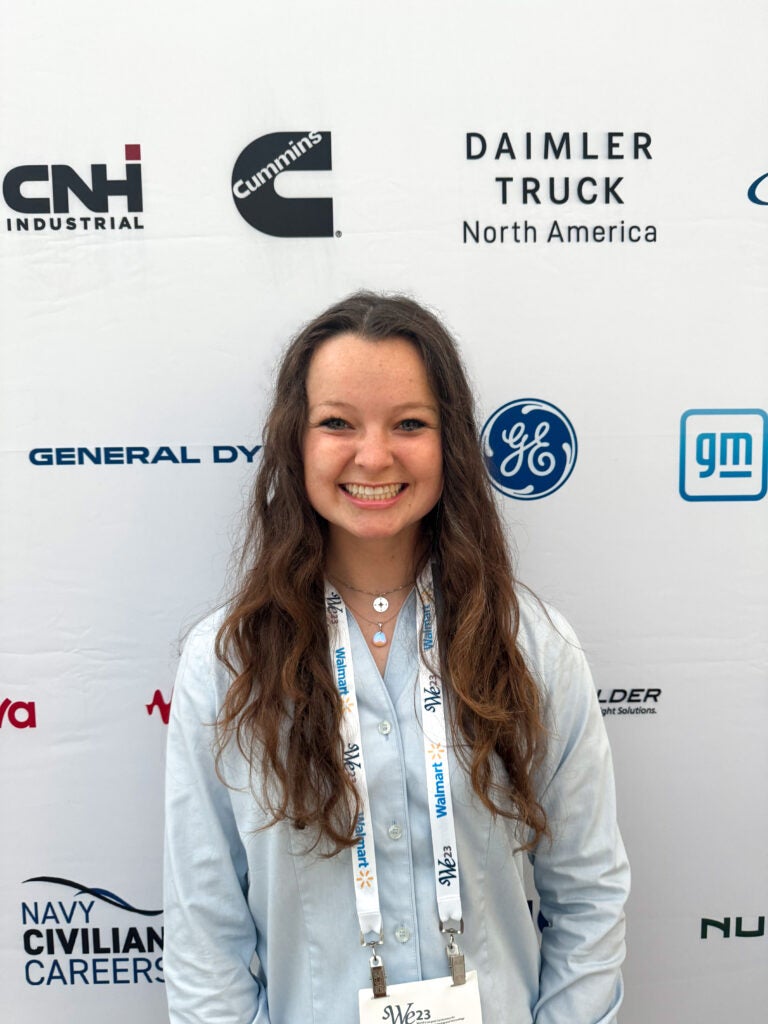One trip to the Kennedy Space Center was all it took for Mycarthy Newton to decide she wanted to be an engineer and work on rockets. It is that dream that has kept her motivated through a very challenging undergraduate career, which she successfully traversed leading to the prestigious Edison Engineering Development Program GE Aerospace following graduation.
“I was lucky to have a strong support system throughout my time here, and my motivation to keep my GPA and participation high was fueled by my goal of working in aerospace.”
When she first visited the University of Rhode Island, the thing that first stood out to her was how friendly and engaging the students and staff were. There was always someone willing to answer questions. It was apparent that the community was well-rounded and invested in the students’ success. “I loved the new building, and also got a sneak peek into the Dynamic Photomechanics Lab on one of the welcome days, which got me excited about the research opportunities. The International Engineering Program was also a big pull,” said Newton. “When I truly thought about where I felt I would fit best, URI was the answer.”
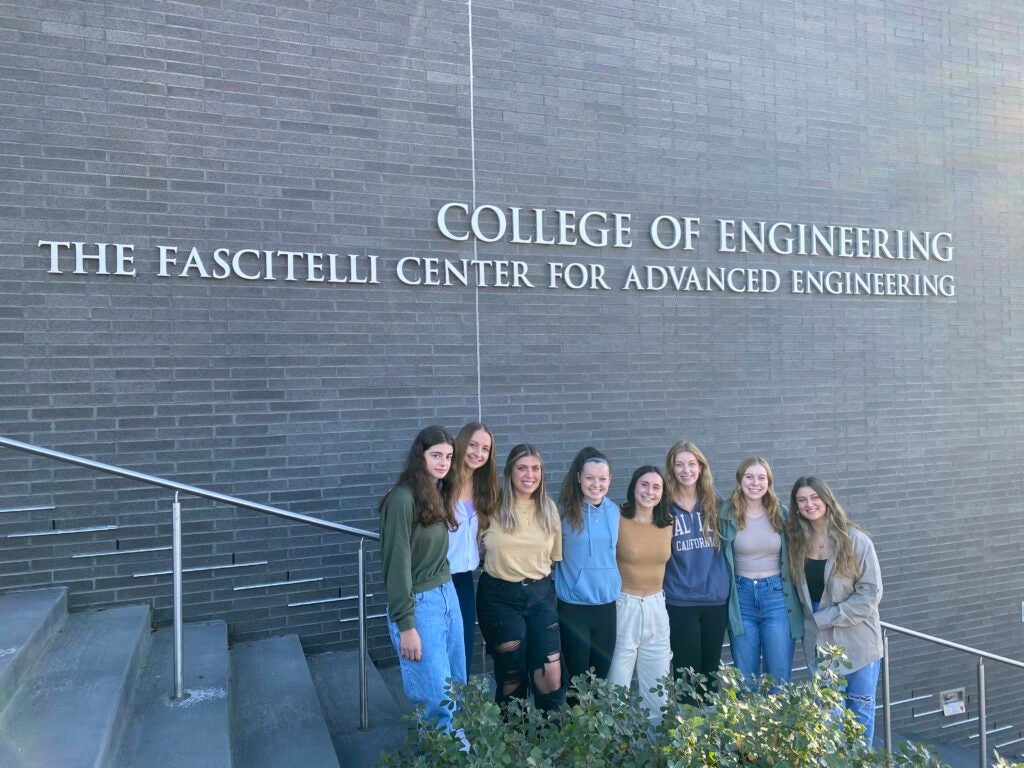
Her freshman year, Newton lived in a College of Engineering Living and Learning Community where she met people she is still friends with to this day. “I attribute much of my success to these relationships, especially during my first year and through Covid-19 online classes during my second year.” After her first year, she was so inspired by her Resident Academic Mentors that she decided to become one. “I held that position for two years, during which I did my best to provide the first-year students with the tools they needed to succeed at URI and beyond. I am very grateful to have been on both sides of the ELLC and experienced such a welcoming community.”
She attributes being involved across campus and in university organizations and programs as what set her up for success. Participating in student organizations such as Women in Engineering and the Society of Women Engineers gave her the opportunity to network and get internships and scholarships. A 2021 SWE conference is what got her an internship with GE Aerospace (then GE Aviation. She interviewed and got the offer while in Indianapolis. She also started the American Institute of Aeronautics and Astronautics club her senior year, which had a very successful first year and has multiple projects planned for the coming years.
Her biggest advice to incoming students would be to get involved. “I would not have had as much success if I was not a part of so many organizations. It’s the best way to meet people and make lasting connections. And if there isn’t a club that interests you, then you can start one that does.”
Newton was an International Engineering Program student, which meant she not only got to pursue her Bachelor of Science in mechanical engineering, but she was able to pair it with a German major and studying abroad for twelve months during her fourth year. “I absolutely loved this experience – before, during, and after my year abroad. The year abroad was amazing; I got to travel to 12 countries in Europe and meet some amazing people.” Her first six months were spent at the Technische Universität Darmstadt, where she got to take aerospace courses in German and do materials research. During the second half of the year, she lived and worked in Munich at an internship with MTU Aero Engines, Germany’s largest jet engine manufacturer. Throughout the whole year, her language skills improved significantly. “When I came back, I served as an IEP Ambassador to assist current students and encourage future students to participate in the program! Being in the IEP helped me to stand out from other students as I applied for jobs and internships,” said Newton.
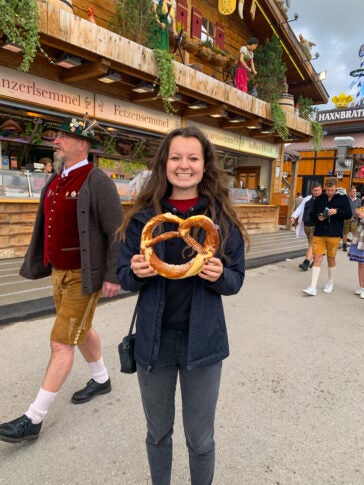
As a student athlete that played on the URI Women’s Rugby team for all four years she was on campus, she is also very fond of the fact that she was able to play rugby while she lived in Cincinnati, Ohio during her internship and while she studied abroad in Germany.
During her third year, she was the women’s rugby President and her final year she served as one of two Captains. She had never played rugby before coming to URI and developed a love for the sport. “The team provided me with yet another community to belong to and rely on. Staying active also helped me to maintain my mental and physical health, which was an important balance while studying engineering.”
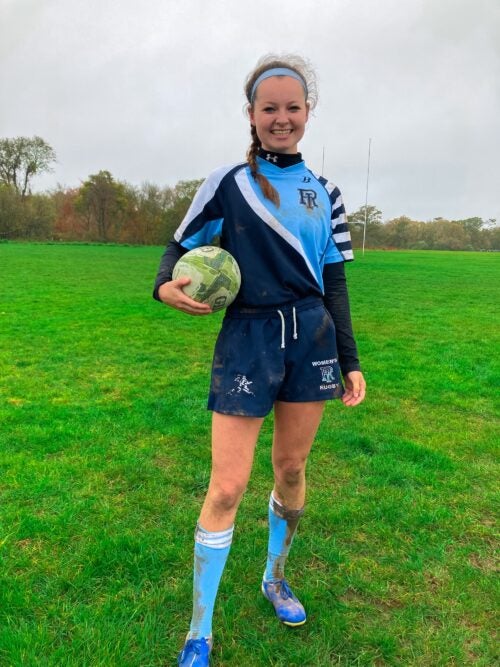
These groups all provided the necessary support networks that helped her get through a very jam-packed five years here and allowed her to grow as a leader. “The biggest challenge I had was staying organized and keeping track of assignments, practices, meetings, and fitting in time to eat! I relied heavily on Google Calendar and making lists. When the schoolwork itself got hard, I reached out to my RAMs or got together with friends to help each other. URI offers many support services such as the Academic Enhancement Center that I always knew I could go to if I needed.”
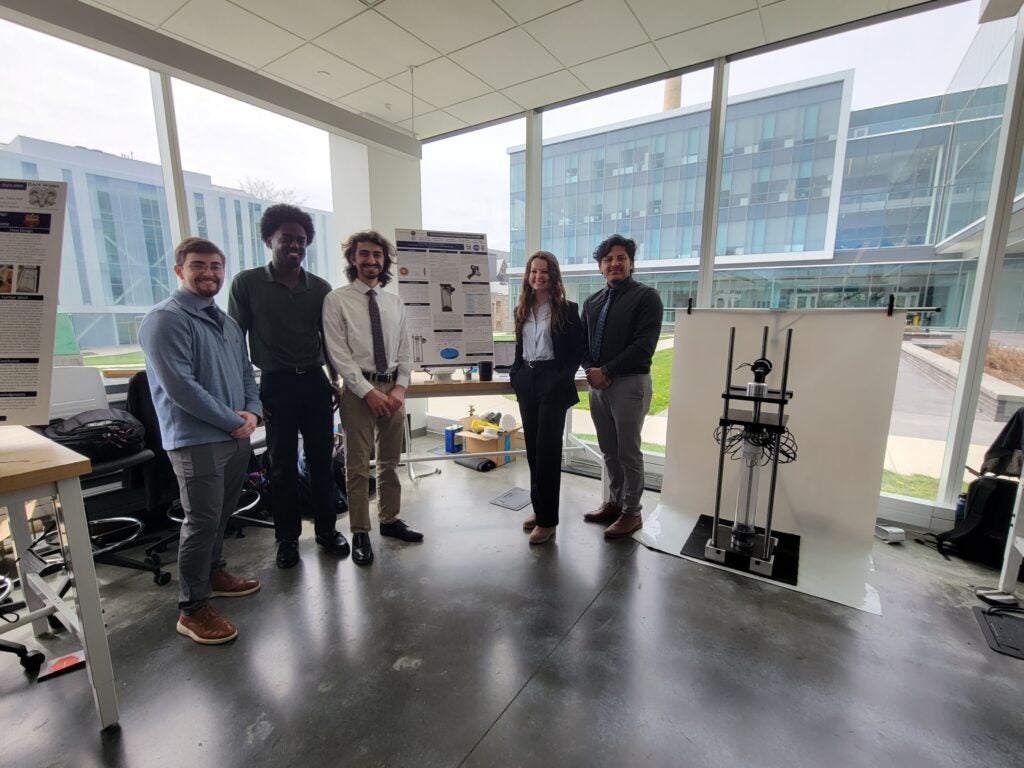
Her Capstone Design Project was sponsored by NASA and was a continuation of a project from the year prior. The research team worked on designing part of a Centrifugal Nuclear Thermal Rocket which is a rocket program that they hope will send humans to Mars. The engines include Centrifugal Fuel Elements which are essentially spinning tubes filled with liquid Uranium, and Hydrogen gets sent through the void in the middle to act as the propellant. Her team was tasked with creating a turbine that would spin this CFE using hydrogen propellant, as well as a control system for startup and shutdown. They chose an internal axial turbine design that was tested first in the wind tunnel and then in a test apparatus. “On the technical side, I learned more about turbine blade design and thermodynamics of nuclear propulsion systems. Overall, however, the benefit of these projects is learning the process for product design and manufacturing. The organization of multiple reports, interdisciplinary work, and group collaboration are all valuable skills.”
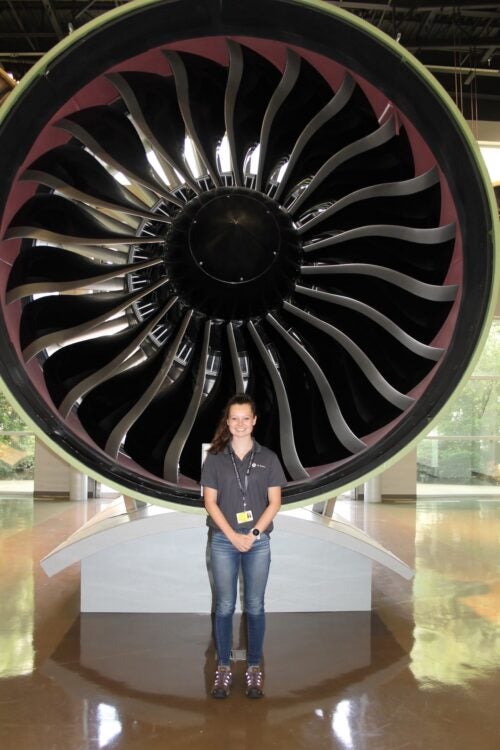
After graduation, she will be heading to Cincinnati, Ohio for the Edison Engineering Development Program at GE Aerospace. This program involves two years of full-time rotations, wherein she will try out three positions within the company before choosing one long-term position. The EEDP also includes courses that count towards a master’s degree, the rest of which will be fully funded by GE Aerospace. Her internship with GE in summer 2022, when they were still GE Aviation, and her involvement with student organizations, research experience, and prior internships such as her one at Toray Plastics, America in summer 2021, all allowed her to excel. “I am very excited to pursue my dream of working in aerospace, particularly on materials that will improve propulsion efficiency.”
